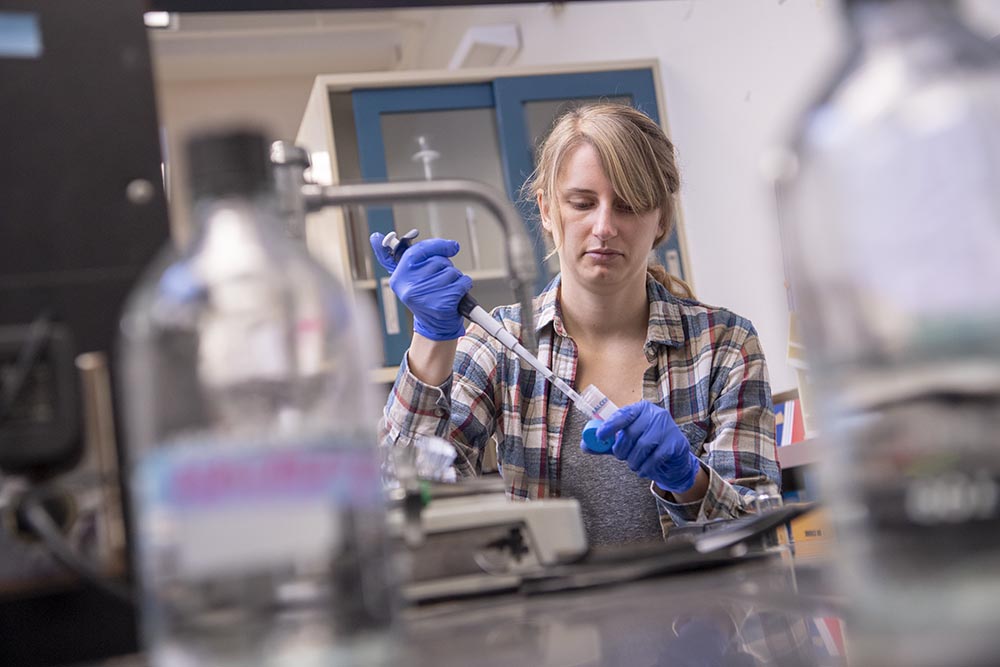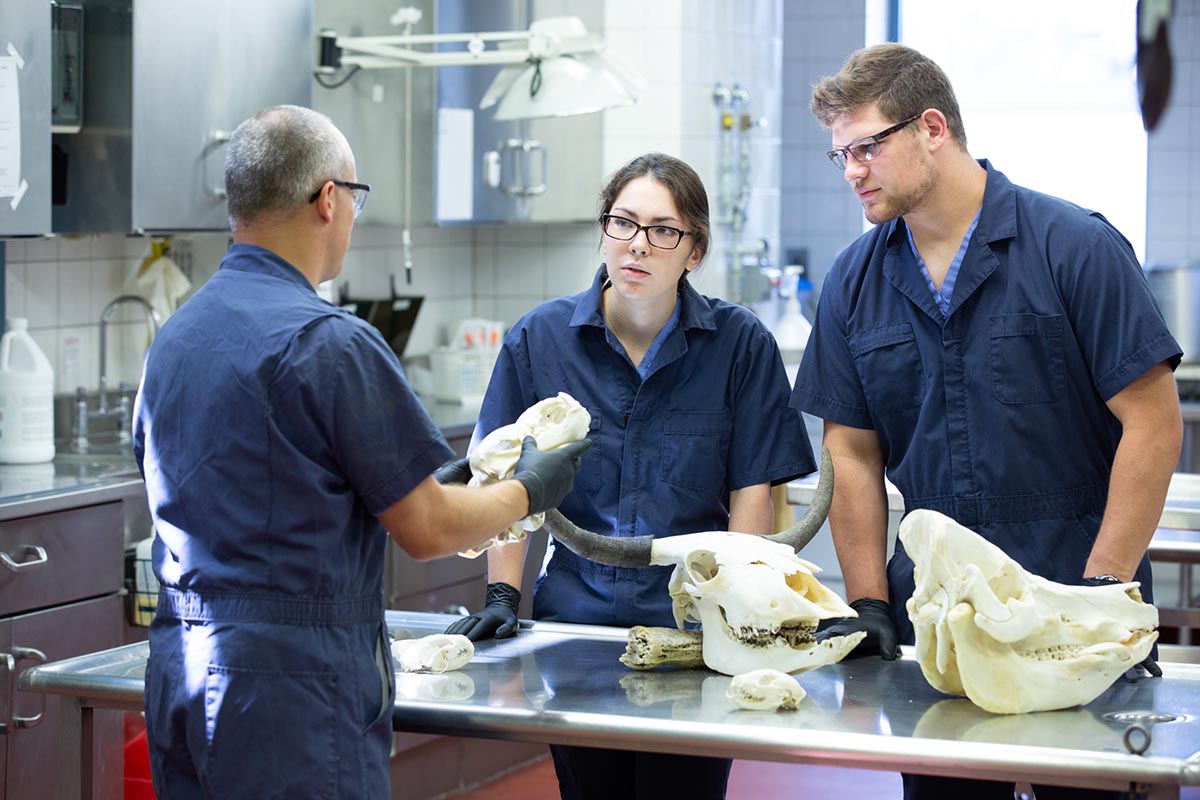Veterinary and Biomedical Sciences Major
Animal health, up close and personal.
Penn State’s Veterinary and Biomedical Sciences major provides a hands-on, science-heavy preparation for veterinary school. It also prepares students for other careers in the research and allied health professions like lab and field research, industry, pharmacovigilance, pharmaceuticals, biomedical development and sales, and beyond. Grads thrive at top veterinary, medical, and other biomedical programs and are recruited to work, teach, and conduct biomedical research across STEM fields and animal health.
Don’t just go to veterinary, medical, or other professional schools. Thrive there.
The Penn State Veterinary and Biomedical Sciences major is a small, tight-knit community united by a fascination with animal health and well-being. We have board-certified and clinically experienced veterinarians on faculty with expertise in various fields of clinical medicine, research, and specialties. These faculty members guide, instruct, and advise VBSC students.
Faculty and staff are committed to ensuring you get the personalized attention you need to meet your goals. If that goal is veterinary school, we strive to help you excel as a competitive applicant.
Veterinary and Biomedical Sciences is the right major if you are:
- an aspiring veterinarian, physician, biomedical researcher, or other biomedical professional
- interested in a career in One Health, public heath, veterinary public health, or animal health
- passionate about science and animal health
- fascinated with applying scientific principles to real-life situations and case-based study
- focused on issues like the control and prevention of infectious animal diseases
- interested in food and agricultural safety and production
See the University Bulletin for details on program requirements, suggested academic plan, and more.
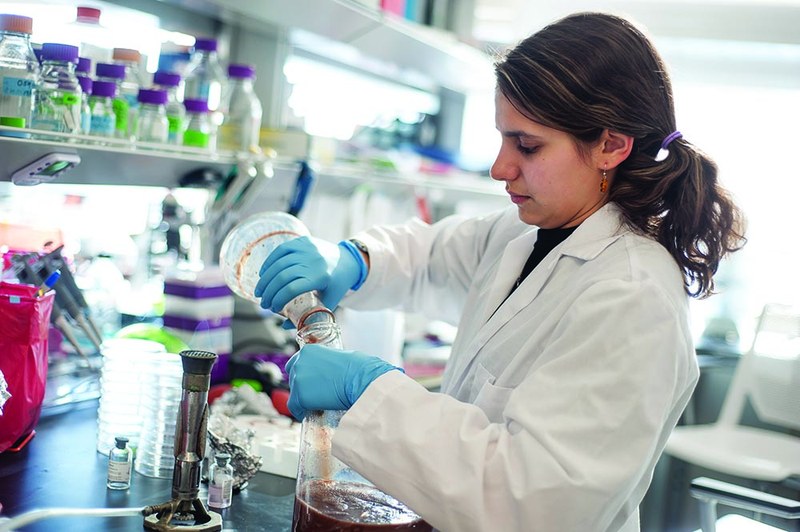
Ag Journeys
“I’ve known I wanted to be a vet since I was a kid. But I always saw myself taking care of dogs or cats—you know, the classic veterinarian. Until now.”
–Luke Trimble
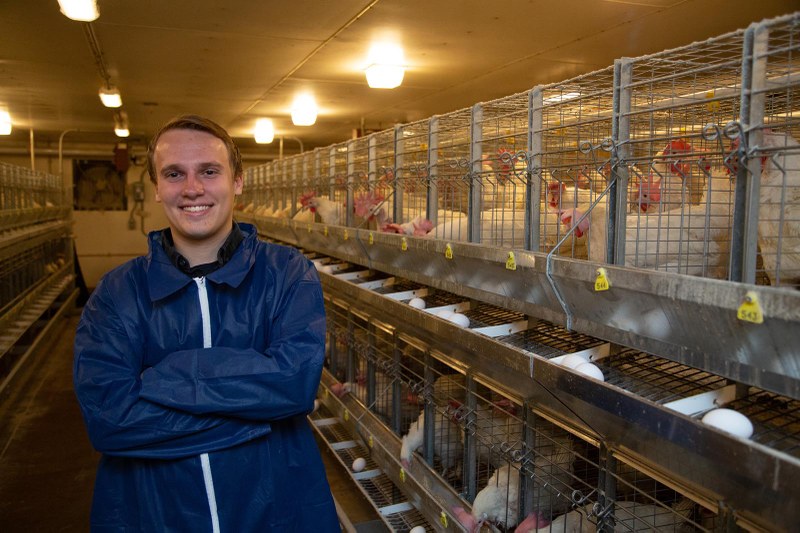
The classroom is only the beginning.
You will study with best-in-class faculty with years of experience teaching and practicing veterinary medicine, but they will be the first to tell you that the classroom and lab are just the beginning of your Veterinary and Biomedical Sciences journey. You bring interest, and we will help you find a faculty-guided club, internship, externship, or hands-on research opportunity.
Craft your experience.
Related clubs and teams
- Pre-Vet Club
- One Health Club
- Biomedical Sciences Club
- Dairy Science Club
- Poultry Science Club
- Small and Exotic Animal Club
- See all clubs and teams
Recent internships
- Veterinary assistant at small animal veterinary hospitals
- Caretaker at city zoos and aquariums
- Farm worker
- USDA APHIS Fellowship at the National Bio and Agro-Defense Facility
- Merck Animal Health Internship
- Penn State Shaver’s Creek Environmental Center public liaison and animal caretaker
Recent workshops and professional demonstrations
- Avian and mammalian necropsy and dissection
- Chemical immobilization and wildlife tracking
- Beef Quality Assurance training
- Comparative Medicine collaboration at Penn State Health Milton S. Hershey Medical Center
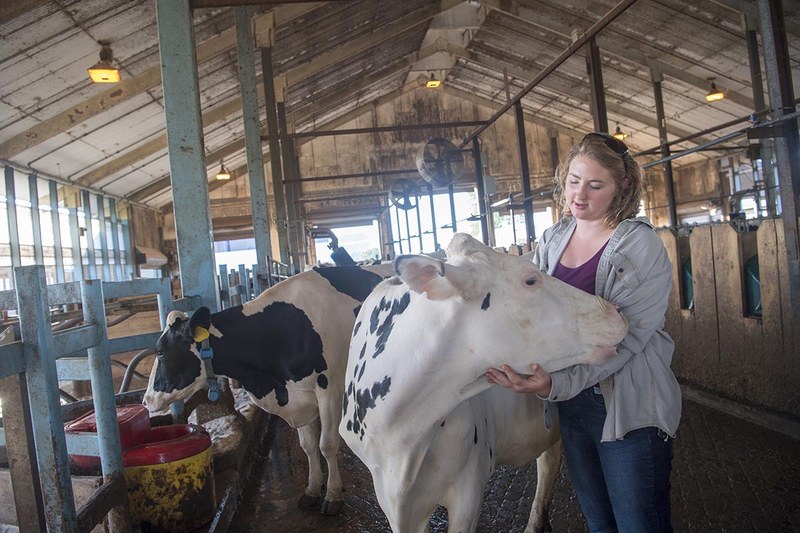
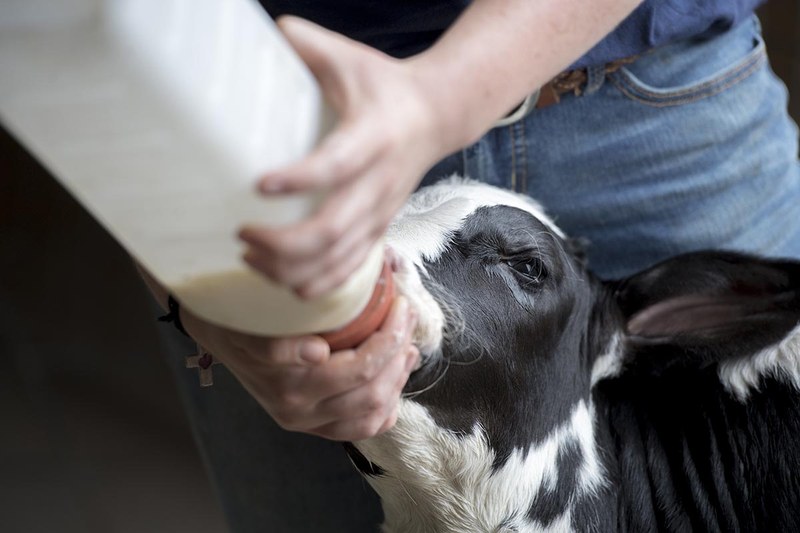
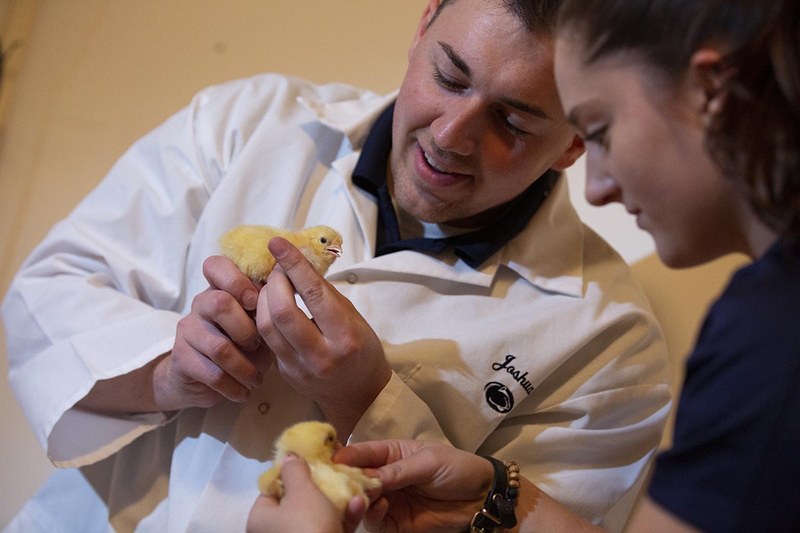
A practical, workforce-ready degree—and a college experience you’ll love.
Penn State Veterinary and Biomedical Sciences grads walk off the stage at graduation and transition to world-class veterinary programs, biomedical research positions, and stellar careers all over the world. You can harness the awesome power of a truly unique education at one of the world’s most prestigious universities.
Our alumni out in the world
- Animal food producers
- Biotechnology companies
- Government agencies like the FDA, USDA, and CDC
- Graduate, medical, or veterinary school
- Pharmaceutical companies like Merck and Zoetis
- Public health and Veterinary Public Health
- Private veterinary and medical practices
- Private research laboratories
- University research laboratories
Veterinary and Biomedical Sciences Career Options
A Penn State Veterinary and Biomedical Sciences degree prepares you for a career in agriculture, business, and science. It also provides the foundation for jobs in STEM fields, many without additional required schooling. Students interested in human medicine find the VBSC major fulfills high science requirements. Additionally, the clinical approach to infectious, nutritional, and metabolic diseases provides excellent preparedness for future allied health careers.
Here is a glimpse into the variety of careers and other pathways you might pursue with a degree in Veterinary and Biomedical Sciences. Our students have access to several career resources to help them prepare for an amazing career!
Clinical Veterinarian (upon completion of veterinary school)
Clinical veterinarians diagnose, treat, and help prevent diseases and injuries in animals. They either treat individual animals or maintain herd or flock health. Some complete residency training in subspecialities. All serve as public health officials in the prevention and detection of infectious diseases as part of the One Health paradigm.
Military Veterinarian (upon completion of veterinary school)
A military veterinarian is also a commissioned military officer who treats diseases and injuries in both working and privately owned animals. Responsibilities may include care for Military Working Dogs with special considerations in orthopedics, triage, and trauma. Military veterinarians may deploy to locations worldwide to provide treatment and preventative care and coordinate with and advise host nation health and agricultural organizations.
Biomedical Researcher
Biomedical researchers investigate aspects of human and animal health with the aim of finding new ways to improve well-being. This includes conducting lab and/or field research in both private and academic settings. They use advanced medical equipment to perform experiments, study the effects of drugs and treatments on human and animal health, advise on interventions, and more.
Laboratorian/Laboratory Scientist
A laboratorian works in a lab, performing assays, analyzing specimens, designing protocols, and managing workflow. Laboratorians are also known as medical laboratory scientists and are vital healthcare professionals who use sophisticated technology to perform testing on blood and body fluids. Their data helps physicians diagnose and treat patients and monitor and prevent diseases.
Public Health Officer
A public health officer coordinates health care institutions, organizations, and resources to ensure health codes and safety practices are followed. They perform field observations, conduct stakeholder interviews, collect samples, write reports, and study disease vectors to find ways to counteract the spread of contagions. Many work with military organizations, providing health inspections to establish efficient health and medical provisions.
Human Healthcare
A foundation in biomedical sciences can be the basis for an advanced healthcare degree. Graduates can go on to rewarding careers as nurses, physicians, physician assistants, medical technologists, dentists, and pharmacists. The options and opportunities are limitless.
Zoologist, Wildlife Biologist
Zoologists and wildlife biologists study animals and how they interact with their habitats and other species. They work with animals in captivity and in nature, studying animal diseases, genetics, and behavior in various settings. Their work is critical to the preservation of ecosystems, the protection of species, and the management of wildlife.
Teacher, Educator
Teachers and educators inform and inspire learners across many settings. They may work with students in K–12 schools or at a university. Some have roles in corporations, non-profits, and government agencies to train and educate staff, the public, and other stakeholder groups.
Pharmaceutical Professional
The pharmaceutical industry relies on a vast professional workforce for the development, manufacturing, and distribution of pharmaceutical products. Examples include sales representatives, formulation scientists, manufacturing or production managers, pharmaceutical manufacturing technicians, and clinical research associates.
Animal Health Sales and Marketing
Roles in sales and marketing span product research and design, consumer and business-to-business sales, communications, marketing, and management. Professionals who work in the specialized animal health industry contribute to efforts that improve the health and well-being of animals everywhere.
Veterinary and Biomedical Sciences students in the news
July 23, 2024
Summer internship gives pre-vet students real-world experience
Penn State’s College of Agricultural Sciences, through its departments of Veterinary and Biomedical Sciences and Animal Science, collaborated with VCA Metzger Animal Hospital and Mars Inc. to establish the Penn State-Mars preveterinary student internship.
Read More
May 29, 2024
Veterinary and biomedical sciences alumna aspires to improve large animal health
Aubrey Vena-Erisman, a 2018 alumna of Penn State’s College of Agricultural Sciences, recently returned to Pennsylvania to open a large animal veterinary clinic in her hometown of Johnstown.
Read More
June 28, 2023
Alumnus commits estate gift to Veterinary and Biomedical Sciences research fund
Jay Hreiz, owner and veterinarian at the Queen City Animal Hospital in Charlotte, North Carolina, has committed $100,000 from his future estate to the research fund in the Department of Veterinary and Biomedical Sciences.
Read More
December 5, 2022
College of Ag Sciences minority alumni return to campus, discuss their journeys
Four graduates of Penn State’s College of Agricultural Sciences recently returned to campus to discuss success in class to success in life as guest speakers on a minority alumni panel, hosted by the college’s Office of Multicultural Affairs.
Read More

